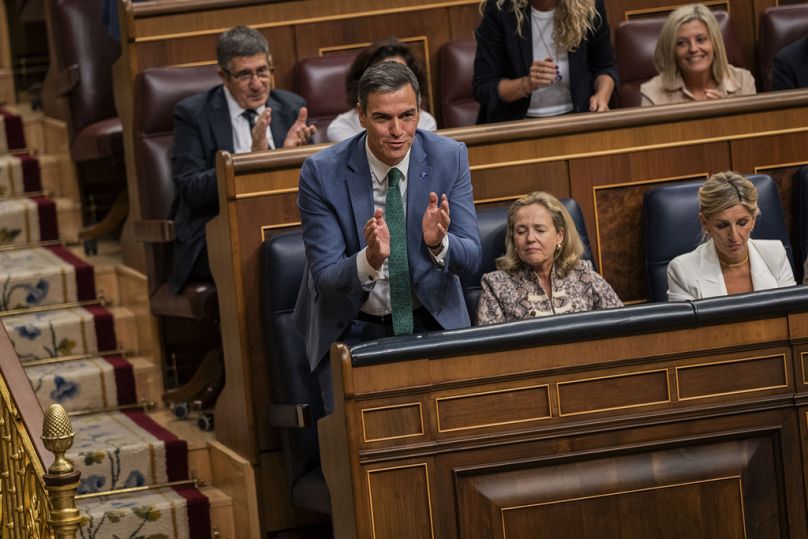If the Spanish conservative leader fails to win approval on his second attempt, acting Prime Minister Pedro Sánchez would have a chance to stay in Moncloa Palace.
The leader of Spain's conservatives failed in his first bid to become the country's next prime minister on Wednesday, falling short of the votes he needed in the Spanish parliament to form a government.
 ADVERTISEMENT
ADVERTISEMENT
 ADVERTISEMENT
ADVERTISEMENT
As expected, the Popular Party leader, Alberto Núñez Feijóo, fell four votes short of the 176 absolute majority needed.
Feijóo will try again on Friday, when the bar will be lowered and he will only need more 'yes' votes than 'no' votes from the 350 lawmakers in parliament.
Spain's national elections on 23 July left the parliament highly fragmented, with lawmakers split between 11 different parties, setting the stage for a difficult road to power for any party.
Feijóo’s party has 137 seats in the Madrid-based Congress of Deputies, the most of any party.
But even with the support of 33 lawmakers from the far-right Vox and two from small conservative parties representing Navarre and the Canary Islands, Feijóo only managed 172 votes in his favour to 178 against.
What next for the Conservative leader?
If Feijóo fails to win approval on his second attempt, acting Prime Minister Pedro Sánchez would have a chance to stay in Moncloa Palace.
The centre-left Socialist leader would need to secure enough support from lawmakers from a group of left-wing, regionalist and separatist parties from Catalonia and the Basque Country.
Parliament debated Feijóo's bid to become prime minister for several hours on Tuesday and Wednesday morning before the vote.
But the debate was dominated by the possibility that Sánchez is considering accepting demands from Catalan separatist parties. They want Spain to grant an amnesty to hundreds, possibly thousands, of people who took part in a failed secession bid in Catalonia in 2017.
Sánchez, who has pardoned several high-profile Catalan separatists, has remained tight-lipped on the possibility of an amnesty, saying only that he wants to continue 'normalising' relations with the region, where tensions have eased in recent years.
But leading Catalan separatists have said the amnesty is a real possibility, while also stating that Sánchez should grant an authorised referendum on independence if he wants to retain their support during a theoretical new term.
"Nobody knows what will happen in this country if my bid to become prime minister fails," Feijóo told lawmakers.
"So it seems reasonable, given that we are in a democracy, that the (Socialist) government should not hide its deals. But they don't even want to talk about it. Transparency and this government are not compatible,” he added.
Feijóo's path to power has been complicated by his party's alliances with the far-right Vox party.
He claimed on Tuesday that he was close to becoming prime minister but was unwilling to pay the political price of an amnesty that the Catalan separatists wanted in exchange for their support.











